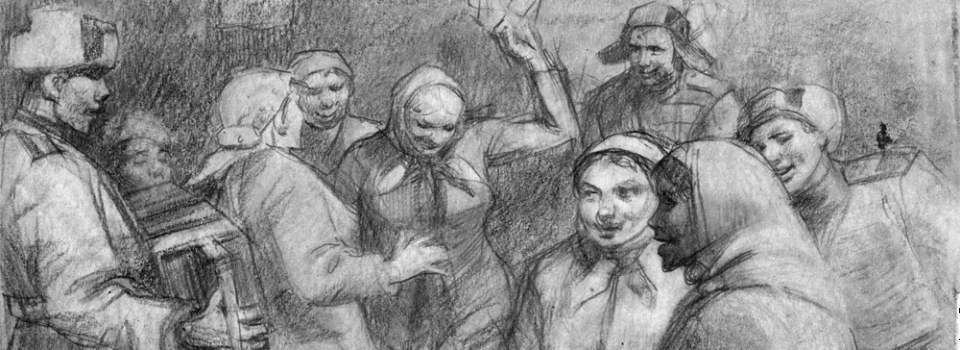From April 28 to October 15, 2022, in the museum of the St. Petersburg branch of the Museum of the World Ocean “Icebreaker” Krasin” (emb. Lieutenant Shmidt, 23 line VO) there is an exhibition of works by Elena Oskarovna Martilla dedicated to the siege of Leningrad.
The exhibition presents 14 lithographs and engravings on cardboard, created by the artist based on sketches and personal memories of what she saw and experienced in the besieged Leningrad in the winter of 1941-1942. The exposition is accompanied by unique photographs from the personal archive of E.O. Marttila and items from the besieged life from private collections of Leningraders.
***
What helps us to survive in difficult times, when there is almost no strength left in one’s body and spirit, and the fear of the unknown is overwhelming? Perhaps, it is the willpower, the sense of responsibility, our love for fellow human beings, the love for life and understanding of our own place in it.
The story of Elena Marttila, who not only survived the Leningrad Blockade at the age of 20, but also managed to fulfil her dream of becoming and artist, is a great example of this. Since early childhood Elena pursued her dream of becoming an artist. It was a difficult path. Her father, Oskar Antonovich Marttila, was executed during purges in the 1930-s because of “national reasons”. Elena was raised by her mother, Evdokia Vasilievna. Evdokia worked at the Kozitsky Plant, because of that Elena was able to go to a kindergarten – “children’s centre” No.77 situated on the Vasilievsky Island. There she was taught how to draw by her kindergarten teacher Ekaterina Nikolaevna Ogneva.
Leningrad College of Art was the only art college that remained open during the Blockade. The college principal, Jan Schablowskij, was saving art school graduates who had remained in the city by offering them a chance to continue their pursuit of love. As a result of his efforts his students ended up getting “worker” bread rations which allowed them to get 250 g of bread instead of 125 g which the rest of the non-working population would get. Elena did exceptionally well at her entrance exams and was placed straight into the 2-nd year. Once all the transport had finally stopped working in December 1941, Elena had to make her own way to the college on foot. She would walk all the way on ice over the Neva River from the Vasilievsky Island to Tavricheskaya Ulitsa, 35. It would take her over 3 hours one way.
Her strong spirit and creative calling helped her to survive, and then later to overcome all the hardships of the post-war life – the illness, all the fears and disappointments – on the path to reaching her goal.
At the exhibition you will learn about Elena Marttila’s life through her work. These are lithographic prints and etchings on cardboard created in the 1970 – 1980-s based on her “Blockade sketches”. Here we find the portraits of her heroes: Olga Berggolz, Tanya Savicheva, Jan Schablovskij, Dmitri Shostakovich, Ekaterina Ogneva, her friends and schoolmates. Everyone has its own story, which left a significant imprint in the artist’s memory. Elena’s self-portrait “Before death”, which she painted in 1942, became the symbol of survival for many Leningraders.
Elena Oskarovna will be 100 years old next year. All these years she managed to keep her life force, wisdom, courage and remained true to herself and to her calling. Her example can be a great support for many people today, tomorrow and always.
Exhibition brochure (in Russian).
